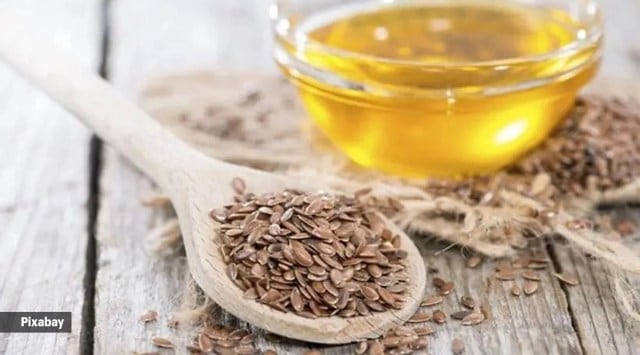Do flaxseeds have enough Omega-3 to fight heart disease and blood sugar?
Those following a plant diet often wonder if there is a good enough plant source for Omega-3. It is on this count that flaxseeds score the highest. Their consumption can yield benefits and proof you against heart disease, diabetes and obesity, say nutritionists
 Flaxseed have been shown to improve insulin sensitivity (Source: Pixabay)
Flaxseed have been shown to improve insulin sensitivity (Source: Pixabay) Most doctors will tell you that Omega-3 essential fatty acids are “good” fats that are needed to keep your heart healthy. And while most of these are derived from animal sources, particularly fish, those following a plant diet often wonder if there is a good enough plant source for them. It is on this count that flaxseeds score the highest. Apart from Omega 3 fatty acids, flaxseeds or linseeds are also rich in dietary fibre and protein. They have some water-soluble and fat-soluble vitamins, which your body needs. Most importantly, their consumption can yield benefits and proof you against heart disease, diabetes and obesity.
WHAT MAKES FLAXSEEDS A DISEASE FIGHTER?
“Flaxseeds contain 70 per cent of alpha linolenic acid (ALA), commonly known as Omega-3 fatty acids, 20 per cent of monounsaturated fatty acid, namely oleic acid, and 10 per cent saturated fats. Each tablespoon of ground flaxseeds contains about 1.8 grams of plant Omega-3s, which are known for their anti-inflammatory properties and normalising heart rhythms, making them a valuable dietary intervention for both heart and brain health. Flaxseeds contain phytoestrogens called lignans, which are similar to the hormone estrogen. That’s why they are called plant estrogen and have antioxidant qualities, which again help in suppressing inflammation. They contain 75 to 800 times more lignans than other plant foods,” says Vani Krishna, Chief Nutritionist, Manipal Hospitals, Bengaluru. Besides, they are rich in both soluble and insoluble fibre, which promote gut health.
BENEFITS OF FLAXSEED CONSUMPTION
Heart disease: “Several studies have suggested that diets rich in flaxseed Omega-3s help prevent hardening of the arteries and keep plaque from being deposited in them by not allowing white blood cells to stick to the inner lining of blood vessels. That’s why regular consumption of flaxseed can help in reducing the risk of heart attacks and strokes,” says Bhakti Samant, Chief Dietician, Kokilaben Dhirubhai Ambani Hospital, Mumbai.
“Several studies show that taking flaxseed daily can reduce total cholesterol and low-density lipoprotein (LDL) or bad cholesterol. The Omega-3 fatty acids as well as the amino acid groups found in flaxseed are even believed to lower blood pressure,” she adds. Krishna advises consuming flaxseed to regulate the lipid metabolism.
Blood sugar and diabetes: The lignans and soluble fibre in flaxseed have been shown to improve insulin sensitivity. “They slow down the digestion process and help in the gradual release of glucose into the bloodstream, preventing sudden spikes in blood sugar levels. This makes it an excellent dietary supplement in managing blood sugar levels in diabetes. However, this should be in addition to the prescribed medicines and should not replace them,” says Samant.
Gut health: Flaxseed is abundant in both soluble and insoluble fibre. “The soluble fibre helps in stabilising blood sugar levels, while the insoluble fibre promotes a healthy gut by facilitating regular bowel movements. This not only helps in preventing constipation but also supports a healthy microbiome, reducing the risk of gut-related diseases,” says Samant. Krishna mentions a study that had shown how 20 g of flaxseed in the diet for 12 weeks had significantly impacted constipation symptoms and stool consistency. “One teaspoon of flaxseed can reduce constipation and as it increases the fecal fat excretion, it may have a vital role in prevention of obesity,” she says.
“They are very helpful if consumed in the prediabetes stage. The soluble fibre of the flaxseed increases the chyme viscosity, delays gastric emptying and absorption of sugar and nutrients in the small intestine. This will also help reduce the appetite and improve insulin production by stimulating GLP-1 ( Glucagon Like-Peptide 1). This type of fibre helps you feel full, so you naturally eat less,” says Krishna.
HOW TO CONSUME FLAXSEED
Flaxseed can be consumed as whole seed, powdered or in oil form. “The ALA in these seeds can withstand high temperature without disturbing the oxidative stability whereas grinding the flaxseed can break the seed coat barrier and reduce the oxidative stability. Therefore, whole seeds are advised. One to two teaspoons of flaxseed can be easily taken in the daily diet. Flaxseed oil has the highest amount of ALA but it gets oxidised faster and is good for just a week at room temperature. It is because of its short shelf life that ground seed is preferred,” says Krishna.
She suggests clever ways to include flaxseed in your daily diet. “Sprinkle one teaspoon over salads, oats and breakfast cereals. You can add flaxseed powder, which can be easily absorbed by the body, in soups for a nutty taste and as a garnish. You can do the same with buttermilk or porridge. Two tablespoons of flaxseed provide 70 kcal, 3 g protein, 3 g fibre and 4.5 g fats,” says Krishna.
SAFE CONSUMPTION LEVELS
While flaxseed offers numerous health benefits, one must consume it in moderation. For adults, a daily intake of one to two tablespoons of ground flaxseed is generally considered safe. Consuming more than this recommended amount can lead to potential side effects like diarrhoea, bloating, and even an overdose of ALA.
Photos


- 01
- 02
- 03
- 04
- 05




























